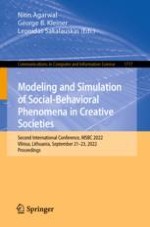2023 | OriginalPaper | Chapter
Behavioral Model of Interaction Between Economic Agents and the Institutional Environment
Authors : George Kleiner, Maxim Rybachuk, Dmitry Ushakov
Published in: Modeling and Simulation of Social-Behavioral Phenomena in Creative Societies
Publisher: Springer Nature Switzerland
Activate our intelligent search to find suitable subject content or patents.
Select sections of text to find matching patents with Artificial Intelligence. powered by
Select sections of text to find additional relevant content using AI-assisted search. powered by
